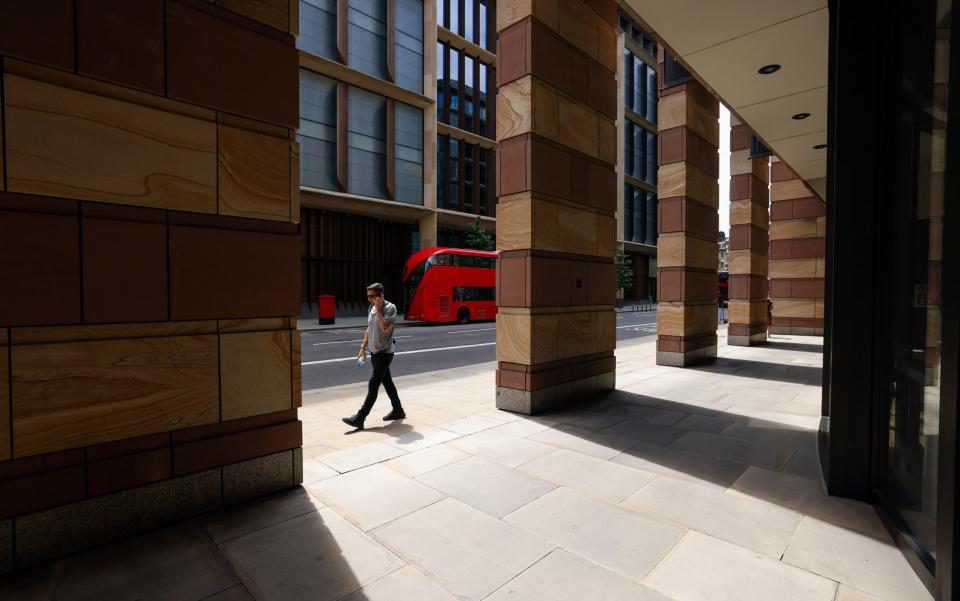Right to work from home could be made law under sweeping post-pandemic plans

A default right to work from home could be enshrined in law under plans being considered by ministers.
The Government will consult on the plan over the summer, which would boost provisions for people to continue to work from home if they wished.
Employers would be required to show it was essential for staff to attend the workplace in order to prevent them from working flexibly, according to the Daily Mail.
This is despite ministers working on a cities recovery strategy that hopes to boost the attractiveness of urban environments for office workers and other groups, The Telegraph has learnt.
Cheaper parking and more outdoor dining in cities could be used to encourage people back to work later this year as the Government leans against ordering a return to the office.
It comes after details of Cabinet Office documents examining how life will look after the final step of Boris Johnson's roadmap out of restrictions were leaked on Wednesday.
The papers set out three potential options for work from home messaging: telling the public to go back to work, remaining neutral or encouraging home working, Politico reported.
On Wednesday night, a senior Whitehall official dismissed the idea that work from home guidance could stay in place long-term, saying: "I don't think that is where we will end up, although it's still very early. The ambition is to get back to more normality."
Government sources also told The Telegraph that there was wariness about ordering people to return to the office but said ministers were keen to be "more proactive" than neutral, while avoiding a "diktat".
Concerns are growing in Whitehall about the impact on productivity and a hit to the "sandwich economy" that underpins towns and cities if people continue to work from home.
Ministers are working on a cross-Government cities recovery strategy, which is examining the impact of the pandemic on the behaviour of four groups key to the urban economy – workers, students, international travellers and domestic visitors.
They are looking at options to make urban centres more appealing to all four once Covid modelling suggests it is safe to do so. These include encouraging councils to improve parking options as well as urging "easements" to local authority rules around street eating in order to make al fresco dining arrangements permanent.
Boosting the use of outdoor space, where Covid can spread less easily, is considered crucial while concern about the virus persists among the public.
New communications campaigns are also thought vital to boosting confidence, with mayors and councils expected to weigh in alongside the Government.
This "carrot" approach to attract workers back to the office differs from the more robust campaign planned by the Government last summer to order them to return.
A minister said on Wednesday night that "being in offices is really important for career development, productivity, and towns and cities – the ecosystem".
But the minister added that "different employers want different things" and said the Government acknowledged that, for some firms and employees, working from home or a hybrid approach could be best.
On Wednesday night reports emerged that ministers are also looking at options to introduce a default right to flexible working within law. The Government will consult on the plan over the summer, which would boost provisions for people to continue to work from home if they wish, the Daily Mail reported.
In March the Chancellor told The Telegraph that home working was no substitute for an office environment in which people could "riff off each other".
A Whitehall source said the timing for lifting guidance to work from home was "very tricky and finely balanced" and may not happen immediately at step four, now pencilled in for July 19 after Mr Johnson announced a four-week delay.
"Some of it depends on the modelling and how they [scientists] think the numbers will be affected by people going back to the workplace with or without certain measures," the insider added. "But there is huge pressure from some quarters to get people back in asap. Officials are well alive to those demands and risks."
The Cabinet Office documents set out proposals for minimum standards of ventilation in workplaces, while suggesting that perspex screens could be scrapped as they are ineffective, it was reported.
The papers also suggested more financial support is needed for people on low incomes forced to self-isolate from work, amid plans to retain the guidance that anyone experiencing Covid-like symptoms should stay at home until they are sure they do not have the virus.
The documents reportedly indicated that some form of border controls and post-travel isolation would also be needed for a significant period to curb new variants. It said face masks could be retained in some settings long-term.
The Prime Minister's official spokesman said: "These claims come from a document that we do not recognise and it does not reflect the latest government thinking.
"We paused at step three for up to four weeks due to the new delta variant and we need to analyse and understand more data on this variant before any future plans are considered."
Matt Hancock, the Health Secretary, said on Wednesday that MPs would return "cheek by jowl" in the Commons in September after the parliamentary summer recess.
Mark Harper, the chairman of the lockdown-sceptic Covid Recovery Group of Tory MPs, raised concerns that he had "seen documents from within Government with very detailed suggestions about what measures may continue" beyond step four.
It is understood these are the same Cabinet Office papers that were leaked. Mr Harper said this was a key reason he planned to rebel against the Prime Minister's extension of remaining restrictions, which were originally due to expire on June 21.

 Yahoo News
Yahoo News 